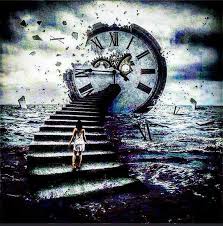
We live life in an effort to constantly ensure and build safety on all levels: emotional, financial, material, environmental, relational and physical. We strive to form a sense of familiarity, and nourish attachments to things, people and routines to create a feeling (which, in reality, is an illusion) of stability and protection in the face of a mad world, ever-changing and constantly threatening our little bubble.
As creatures of habit, deeply attached to a fixed idea of self, others and the world, we don’t like change, even when it’s necessary. We know when something must be changed in our lives, but all too often, the comfort of our habits and beliefs is somehow more appealing.
Usually, we use the past as a reference, and settle into toxic routines and set ideas of self, which end up defining our future along the same old story lines.
Until one day…we break down.
When our whole world shatters despite our best efforts to maintain the status quo, we break down and lose it all: our sense of safety and the investments in the future we’ve made. We’ve protected ourselves, because change was never the plan. When this happens, we experience it as devastating. Each and every time, we fight, resist, and consume ourselves with changing others or outside circumstances instead of ourselves. Often, we pick ourselves up and manage to get back on the horse—sometimes with new eyes and a fresh attitude, other times with the exact same blindfolded vision.
If life still feels to you like a never-ending series of breakdowns, pains and dramas, you have not awakened to the miracle of brokenness.
You have not yet risen into the light that ultimately brings permanent peace and sets you free.
Moments of drastic change in our lives force us to immediately face ourselves. They throw into question all of the concepts we’ve tried to forge or preserve over the years, and shatter our expectations of the future and of others. We suddenly become powerless in the realm of a new, this-doesn’t-make-sense universe. We’re insignificant entities on the surface of a planet that continues to go around and always will, regardless. The motion of life carries on, and we can’t do anything about it, even though we want it all to stop so we can grieve in peace, with universal acknowledgement of our pain and signs of salvation popping up everywhere. They don’t always appear when you need them. You may be so overwhelmed that you can’t see the signs. In these shattering moments, though, there is hope: from the most unexpected place, salvation comes. That place is brokenness.
When you are broken, lying there in pieces on your bed or your bedroom floor, you actually have a rare opportunity to see things as they really are. You can see that you have spent your life feeding an illusion or avoiding reality. Everything eventually ends, and we do not get to decide when.
All that has a beginning, by necessity, must end. The very nature of life, of existence, of the manifested world IS change.

Life cannot exist without change
Your happiness and beautiful experiences would never have been available to you had you not experienced change in the first place.
Change and destruction allow the flow of life’s energy to maintain itself. They are the drive of creation, and the universe is constantly renewing, creating and breaking what is, just to allow new possibilities and opportunities to arise: within ourselves, the choices we make, the types of relationships we choose, daily habits, new facets of ourselves, and, ultimately, how we decide to bounce back again.
If you are drowning in profound grief, inevitable questions emerge. Who am I? How can I move forward? You’re searching for answers because you desperately need to know who and how.
Actually, the answer is right there, immediately available to you as soon as crisis knocks you down.
You are no one. No one in the world of form and impermanence, where everything vanishes at some point—even the idea of ‘I’ and whatever we have made of it.
When your reality is destroyed, nothing is truly lost but your illusion of self.
The notion of a separated, individual self, defined essentially by physical aspects, achievements, personal history and an imagined or well-planned future, inevitably crashes and shows its true, ephemeral nature.
On a universal level, whenever you are in the flux of change, you are flowing with the essence of life.
On a universal level, whenever you are in the flux of change, you are flowing with the essence of life. You become part of its energy and subject to it at the same time.
Flowing with change, rather than resisting, is the wisest thing you can do. When you flow with it, your imaginary pain vanishes. When you are embracing change, you realize that beyond your problems, beyond your perceived world of gain and loss, your formless essence is pure, permanent life energy.
Interestingly enough, in Hindu Mythology, Shiva, the God of Destruction, works on equal footing with Brahma, God of Creation, and Vishnu, God of Protection. The three represent the most important deities in Hinduism.
Shiva is venerated for bringing insight into our blind attachments, overindulgent habits, and the wants and illusions of the ego. Shiva destroys the ego, which represents false identification with form (or the manifested world) and reminds us to live fully in the present moment.
Live the moment to the fullest, and let it all go the minute after. In this way, every moment offers a fresh start, a new richness and intensity without the entrapment of delusions.

SHIVA, the God of Destruction, an archetype of inspiration
Brokenness can be seen as a blessing. It acts as an incredibly powerful moment when we can start all over again, but this time completely afresh, freed, and more alive than ever before. Ultimately, grief and loss are necessary; and this must be known to appreciate the value and meaning of love, of others, and the beauty of the present moment.
Suffering also becomes an extraordinary chance to understand others, empathize with their pain and come closer to the meaning of love and tolerance. One gains the chance to show solidarity and become community-orientated rather than self-absorbed with existential problems.
In your brokenness, when you cultivate empathy for others, you become able to connect meaningfully and deeply, while at the same time mitigating the effects of isolation.
We all experience grief and loss, and everyone you meet is fighting a battle you know nothing about. As you open your heart beyond your grief and shattered self, your pain may seem very small compared with what others may be going through.
Brokenness humbles you, and turns you in the direction you truly belong: toward others. The same essential emotions and life energy flow through everything that is.
Conclusion
In conclusion, brokenness comes with many gifts and valuable wake-up calls. It gives us a chance to reassess our values, priorities, attachment styles, and mistakes, and see more clearly what truly matters. It points out our toxic habits, relationships, and detrimental or addictive activities—essentially, all that needs to be let go of because it has drawn us into something, we never really wanted in the first place.






